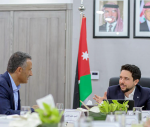You are here
Israel’s narrow options
Jan 26,2016 - Last updated at Jan 26,2016
Earlier this week, a 13-year-old girl was shot dead by an Israeli security guard near the Almon Jewish settlement, in the Jerusalem area, during an alleged stabbing attempt.
Ruqayya Eid Abu Eid is not the first child to be killed by Israeli soldiers or armed guards upon stabbing allegations.
According to Children Defence International (CDI)-Palestine, 29 other children were killed in the same manner in the last four months.
Dozens of other Palestinian men and women were also murdered upon this standard Israeli “stabbing attempt” claim.
Last October, I watched a video of a Palestinian being shot to death by a Jewish settler. While the victim’s body was lying on the street, surrounded by some soldiers and settlers, one soldier threw a knife, which he visibly received from a colleague of his, on the body, obviously to justify the murder as a stabbing attempt.
What is really hard to comprehend is how a security guard, who is on duty and on full alert, who is armed, who is physically strong and who is supposedly well trained not only on how to defend himself from a frail little girl but from equally lethal and ruthless armed attackers, could be only able to save his own life from Ruqayya’s knife by shooting the child.
Either way, and on the basis of the recent stabbing trend, the situation for Israel seems to be dire.
If 13-year-old Ruqayya did indeed help herself to a knife from her family’s kitchen and headed to a nearby settlement to stab a Jewish guard to demonstrate her rejection of the occupation, then Israel should be in trouble, as that clearly indicates that Palestinians’ will to resist the occupation and fight for their dignity and liberation is not going to be tempered by Israel’s cruelty or by Palestinian Authority’s (PA) commitments not to ever allow any form of new Intifada against the occupier.
It also indicates that Palestinians, generation after generation, will continue to devise novel methods to challenge Israel’s superior military power and lethal occupation practices, sparing no sacrifice to reach that irrevocable goal.
If, on the other hand, the alleged Palestinian stabber was innocent, as many similar previous cases indeed were, and if the armed guard was terrified of the young girl to the point where he needed to kill her to assure his own safety, then Israel is in even bigger trouble.
Israel now, with the occupied West Bank, including Jerusalem, is home to almost equal numbers of Arabs and Jews.
The five-decade-old Israeli occupation, Israel’s cruel occupation measures, the colonisation of Arab land, the strangling restrictions, the siege and the appalling manner in which Israel has been treating its Arab citizens as well as the occupied population, Gaza included, has systematically eliminated any possibility of peaceful and normal cohabitation.
How could there be communal peace in a mixed society where every Arab is viewed as a potential threat to every Jew and where Jewish lives, civilian or military, can only be saved by on-the-spot elimination of the assumed danger, i.e., indiscriminately murdering Arabs on mere suspicion or imagined fear.
This is the obvious outcome of the extended occupation.
The first Palestinian anti-occupation Intifada, that started in 1987 and ended in 1991 as a result of the new conditions created by the Madrid Peace Conference and the Oslo accords, had done so much corrupting damage to the morale and competence of the Israeli army.
While struggling to handle internal occupation-related troubles, Israel’s army suffered humiliations in its repeated, but hardly successful external wars, against Lebanon and Gaza in the last three decades.
PA security cooperation with Israel did seem to help for some time. But despite PA’s recent assurances and security cooperation, Israel’s internal security dilemma is clear.
No amount of security precaution and vigilance could effectively handle the Arab-Jewish human mixture except when totally liberated from hostility and animosity.
Apparently, all Israel’s projects have so far failed.
The status quo is impossible to sustain indefinitely and there are certain signals that the Palestinians are not going to remain quiet for much longer in the absence of hope that the occupation may at some time end and with Israel blocking every opportunity for a decent settlement of the century-long conflict.
Neither is it likely, under the prevailing circumstances, that Israel will be able to guarantee peace at home for its citizens while emphatically denying the Palestinian their indisputable rights and while subjecting them to indefinite captivity.
Even the great advantage the peace process had granted Israel, with the resulting peace treaties and understanding with some Arab states, has been gradually undone by Israel’s extremist, aggressive and negative policies.
This actually narrows Israel’s options to no more than three, of which two seem to be almost impossible.
They are:
1. End the occupation of all Arab lands and dismantle the settlements up to the exact 1967 lines, including in Jerusalem, and allow the Palestinians to have their independent state.
2. Grant all occupied Arabs equal rights in a bi-national state that is a liberal democracy.
3. Remain, as is, in perpetual war internally and externally, until the state is fully exhausted and depleted.
It is not difficult to predict which of the three options would be Israel’s favourite choice.












